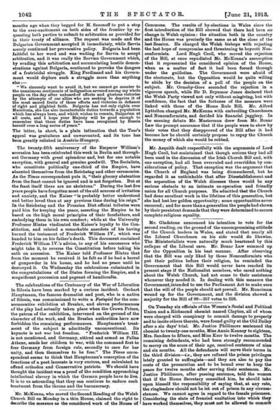Mr. McKenna, who moved the Second Reading of the Welsh
Church Bill on Monday in a thin House, claimed the right to describe the measure as the considered work of the House of
Commons. The results of by-elections in Wales since the first introduction of the Bill showed that there had been no change in Welsh opinion : the situation both in the country and the House was precisely the same as at the close of the last Session. He charged the Welsh bishops with rejecting the last hope of compromise and threatening to boycott Non- conformists. Lord Hugh Cecil, who moved the rejection of the Bill, at once repudiated Mr. McKenna's assumption that it represented the considered opinion of the House, when as a matter of fact it had been forced through under the guillotine. The Government were afraid of the electorate, but the Opposition would be quite willing to abide by the decision of a poll of the people on the subject. Mr. Ormsby-Gore seconded the rejection in a vigorous speech, while Sir D. Bryrunor Jones declared that the Welsh Party viewed not only without misgiving, but with confidence, the fact that the fortunes of the measure were linked with those of the Home Rule Bill. Mr. Alfred Lyttelton charged Mr. McKenna with embroiling Churchmen and Nonconformists, and derided his financial jugglery. In the ensuing debate Mr. Masterman drew from Mr. Bonar Law the prompt assurance that if the people were to show by their votes that they disapproved of the Bill after it had become law he should certainly propose to repay the Church the money of which she would be robbed.










































 Previous page
Previous page